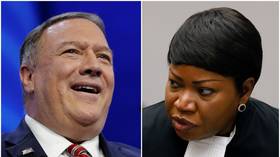ICC stands its ground: an international body that refuses to serve US policies
20 Mar, 2020 17:48

To maintain its global dominance, the US needs the obedience of not only other nations, but international bodies as well. The International Criminal Court, which has again refused to bow, is a painful thorn in Washington’s side.
Following a ruling earlier this month by the ICC’s Appeals Chamber that a formal investigation of US officials for war crimes in Afghanistan could proceed, Washington responded with its usual threats of sanctions. US Secretary of State Mike Pompeo called out two ICC staff members by name and intimated that they and their family members could be prohibited from traveling to the United States.
ALSO ON RT.COMUS doesn’t even need to bully the International Criminal Court — it can’t do a thing about the war crimes in Afghanistan anyway
But refusing to back down, the ICC insisted that its investigation will go forward, pointing out that it is “an independent and impartial judicial institution” and that its organs “act strictly within the mandate bestowed upon them by the Rome Statute, the ICC's founding treaty.”
This exchange of hostilities is the latest demonstration of the ICC’s growing sense of independence and confidence. For years the court was derided as biased — not against America, but against Africa — and as failing to uphold principles of equal justice. In 2016, a number of African countries started signaling their intention to leave the ICC, noting that since the court was established in 2002, only Africans had been prosecuted.
Since then, however, the ICC has broadened its scope and opened new investigations, including some that don’t necessarily align with US foreign policy objectives. In 2016, the ICC’s Office of the Prosecutor began investigating alleged crimes related to the 2008 international armed conflict in and around South Ossetia, including alleged crimes committed both by Russia and US ally Georgia.
In late 2019, the ICC’s Prosecutor Fatou Bensouda said that an investigation could proceed into alleged crimes committed by Israel in occupied Palestinian territory. In a statement, the ICC announced that “all the statutory criteria under the Rome Statute for the opening of an investigation have been met.” This led Israel, which is not a state party to the ICC, to enlist friendly states such as Brazil, Hungary, Austria, Germany, the Czech Republic and Australia to lean on the court to drop the investigation — so far, to no avail.
The ICC has also indicated that an investigation into the effects of US sanctions on Venezuela might be in the works. Last month, Bensouda announced that she had received a referral from the Government of Venezuela regarding the situation on its territory. Venezuela alleged that US sanctions amount to crimes against humanity. Rather than dismiss this claim out of hand, Bensouda took preliminary steps to enable an investigation to proceed.
Taken together, the recent developments related to the ICC could spell trouble for the US, whether or not the investigations lead to actual prosecutions of US officials or US allies. This is because US hegemony relies on the subservience not only of nation-states, but of international organizations.
The US has perceived the ICC as a threat ever since it was established 18 years ago, even taking the extraordinary measures in 2002 of repudiating its earlier signature to the Rome Statute and enacting a law authorizing the use of military force to liberate any American citizen being held by the court, which is located in The Hague.
ALSO ON RT.COMBy denying Iran’s foreign minister visa for Security Council visit, America has lost moral right to serve as home for UN
With those threats failing to intimidate the court, the US is now resorting to punitive measures. But so far, judging by the ICC’s response, it is not bowing to pressure. Instead, it appears to be taking its mandate to investigate war crimes seriously, and demonstrating that the US military cannot expect to act with total impunity in its operations abroad.
This reinforces the principle of universal jurisdiction when it comes to grave crimes such as torture. It also serves as a reminder of how countries can avoid ICC investigations and prosecutions. Since the ICC only steps in when national authorities do not properly investigate grave crimes, there is a simple way for countries to avoid this scrutiny: prosecute
The statements, views and opinions expressed in this column are solely those of the author and do not necessarily represent those of RT.

0 Comments:
Post a Comment
Subscribe to Post Comments [Atom]
<< Home